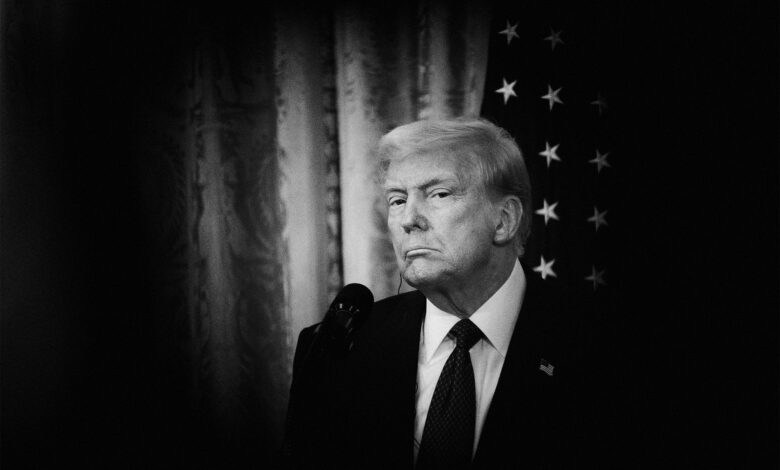“They’re Scared Shitless”: The Threat of Political Violence Informing Trump’s Grip on Congress

In the past week, Donald Trump has signaled a desire to rule like a strongman rather than a president constrained by constitutional norms. Last Friday, Trump’s vice president, JD Vance, scolded democratic NATO allies and met with the leader of Germany’s extreme-right AfD party. On Saturday, Trump declared on social media: “He who saves his Country does not violate any Law.” This Tuesday, Trump blamed Ukrainian president Volodymyr Zelenskyy for the brutal war that was launched by Russian dictator Vladimir Putin. “You should have never started it,” Trump falsely said of Zelenskyy, when in fact Putin invaded Ukraine in February 2022. The US president then doubled down on the feud Wednesday, calling Zelenskyy a “dictator.”
Democrats are in the minority in both the House and Senate, which means the federal courts and congressional Republicans are the only guardrails on Trump’s second term. So far the judicial system seems to be holding—though a Trump-packed Supreme Court is now destined to rule on all manner of alleged overreach in the coming months. (And it’s an open question as to whether Trump will actually abide by rulings that go against him.)
Republicans in Congress, however, have consistently folded—approving all of Trump’s Cabinet picks, such as Robert F. Kennedy Jr. and Tulsi Gabbard, with only a faint whiff of pushback on some of their boundary-scorching backgrounds. The confirmations predictably short-circuited many Democratic observers, but the rolling headlines of late have even some Republicans decrying the seeming erosion of checks and balances in recent weeks.
“These are the heirs of the Greatest Generation, and they turned out to be the worst generation,” says Stuart Stevens, who served as a chief strategist on Mitt Romney’s 2012 presidential campaign and has since left the GOP, joining the anti-Trump Lincoln Project as a senior adviser. “It’s tempting to compare Republicans to Prussian aristocrats in 1930s Germany. But Prussian aristocrats were more responsible. They were dealing with civil unrest and the threat of a communist takeover. Republicans today have historically low unemployment, a record stock market. What’s their excuse?”
Political survival is one. Senate and House Republicans know Trump will orchestrate the running of a primary challenger backed by Elon Musk’s unlimited resources if a member defies him. But this is not the whole story of Republican subservience to the president. In private, Republicans talk about their fear that Trump might incite his MAGA followers to commit political violence against them if they don’t rubber-stamp his actions.
“They’re scared shitless about death threats and Gestapo-like stuff,” a former member of Trump’s first administration tells me.
According to one source with direct knowledge of the events, North Carolina senator Thom Tillis told people that the FBI warned him about “credible death threats” when he was considering voting against Pete Hegseth’s nomination for defense secretary. Tillis ultimately provided the crucial 50th vote to confirm the former Fox & Friends host to lead the Pentagon. According to the source, Tillis has said that if people want to understand Trump, they should read the 2006 book Snakes in Suits: When Psychopaths Go to Work. (When asked for comment for this story, a spokesperson for Tillis said it was false that the senator had recommended the book in that capacity. The FBI said it had no comment.)
From the moment Trump descended his golden escalator in June 2015 to announce his first run for president, he injected menace into his political rhetoric. On the campaign trail he talked about wanting to punch protesters in the face. During his first term, he praised Montana’s then representative Greg Gianforte for physically attacking Guardian reporter Ben Jacobs in 2017. “Any guy that can do a body slam, he is my type!” Trump said. (Gianforte later pleaded guilty to misdemeanor assault and received a six-month deferred jail sentence.) When protests erupted after a Minneapolis police officer murdered George Floyd in 2020, Trump called protesters “thugs” and said: “When the looting starts, the shooting starts.” The phrase echoed a remark made in the 1960s by a Miami police chief associated with stoking racial tensions in the city (Trump claimed he wasn’t aware of its origins). In a September 2020 debate against Joe Biden, Trump refused to condemn white supremacist violence and told the Proud Boys to “stand back and stand by.”
January 6 further catalyzed GOP fear of Trump-inspired violence. Romney told his biographer, McKay Coppins, that an undercurrent of anxiety thwarted Republican efforts to formally punish Trump for his role in inciting the riot. “One Republican congressman confided to Romney that he wanted to vote for Trump’s second impeachment, but chose not to out of fear for his family’s safety,” Coppins wrote in his book. “When one senator, a member of leadership, said he was leaning toward voting to convict, the others urged him to reconsider. You can’t do that, Romney recalled someone saying. Think of your personal safety, said another. Think of your children. The senator eventually decided they were right.”
Former Wyoming representative and prominent anti-Trump Republican Liz Cheney told CNN that House GOP members confided to her that they were “afraid for their own security—afraid, in some instances, for their lives.” Representative Jason Crow of Colorado told NBC News after January 6: “I had a lot of conversations with my Republican colleagues last night, and a couple of them broke down in tears—saying that they are afraid for their lives if they vote for this impeachment.”
Republican Peter Meijer, then a Michigan representative, told Atlantic writer Tim Alberta in 2021 that one colleague seemed to nearly have a nervous breakdown over fears of being harmed by MAGA supporters if he were to vote to certify the 2020 election results: “He asked his new colleague if he was okay,” Alberta reported. “The member responded that he was not; that no matter his belief in the legitimacy of the election, he could no longer vote to certify the results, because he feared for his family’s safety. ‘Remember, this wasn’t a hypothetical. You were casting that vote after seeing with your own two eyes what some of these people are capable of,’ Meijer says. ‘If they’re willing to come after you inside the US Capitol, what will they do when you’re at home with your kids?’”
Trump’s mass pardoning of January 6 participants has recentered those events in Republican minds of late.
“A guy sends a mob into your workplace to kill you, and you’re okay with that?” Stevens tells me, speaking about his frustration with congressional Republicans. Stevens says the clemencies send the message to Republicans that Trump will defend those who commit political violence in his name.
“I talked to Lincoln Project donors,” Stevens says. “These are powerful and wealthy people. And I can tell you a percentage of them are talking about leaving the country.”
“The Republican Party is united,” a White House spokesperson said.
Still, some say Republicans are using the threats of violence as cover. Bill Kristol, cofounder of the Never Trump outlet The Bulwark, tells me Republicans could ignore the threats if they wanted to. Kristol was subject to online harassment in early February after Elon Musk falsely promoted claims on X that Kristol received money from USAID, the foreign aid agency recently gutted by the Department of Government Efficiency.
“I never read the comments or notifications,” he tells me. “Senators can probably get quite a bit of protection if they need it, so I’m a little less sympathetic.”


